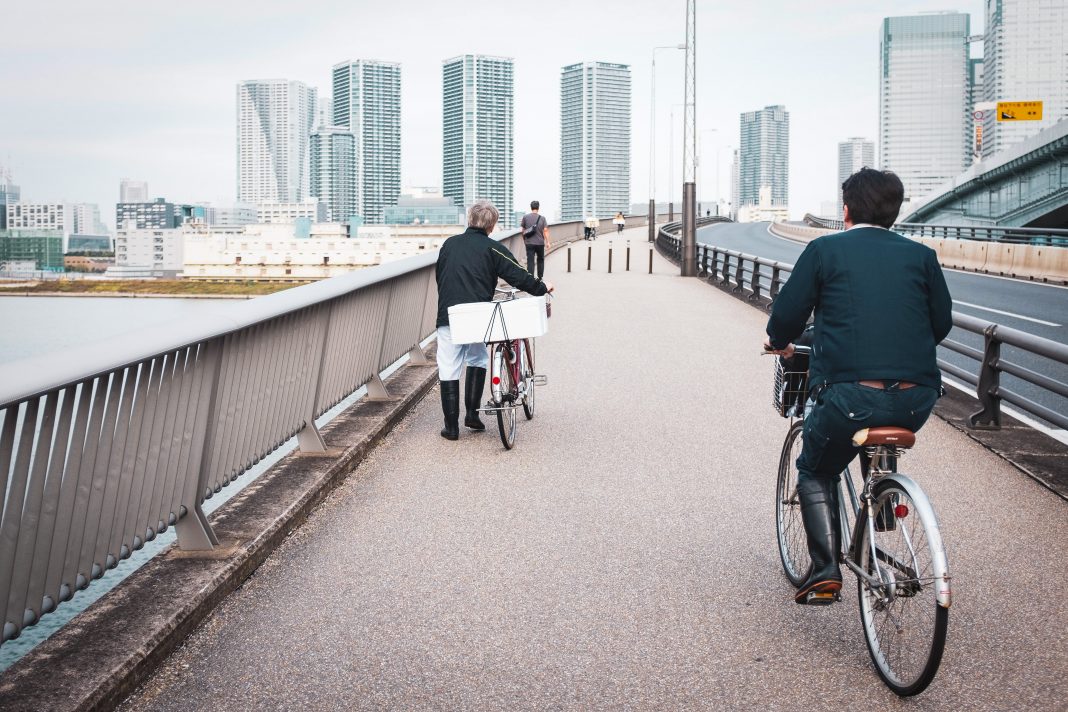Commuters are one of the key target groups when it comes to encouraging more active modes of transport – so what can be done by employers and large companies to encourage their employees to ditch their cars and choose to walk, cycle or e-scoot to work?
The sound of angry car horns and traffic lines backed up for miles along our morning journey to work is a scene that’s all too familiar for most of us who commute on a daily basis.
But have we developed a “blindness” to the way that motor vehicles have taken over our towns and cities, and if we have, then how do we reclaim our streets from cars, and choose more sustainable mobility options?
Getting employees to make a permanent switch to eco-friendly transportation can be a struggle for employers – but what exactly is the barrier to behavioural change, and is it possible to overcome it?
Why Are the Gears Stuck When It Comes to Alternative Transportation?
A major study carried out in 2019 took a look into the commuting habits of over 70,000 employees at an international European airport to understand why so many people choose to travel to work every day by car.
Based on the data the researchers gathered, they were able to devise a series of measures to nudge workers towards more active forms of transport.
They did this by focusing on the types of transport methods that employees told them they wanted to engage in. Carpooling, for example, was one of the most favoured.
Yet, despite 15,000 employees saying they were interested in taking part, fewer than 100 actually signed up for the service; and only 3 were using it a month later.
They found that the nudges failed mainly because employees were not having to bear the full financial or environmental costs of commuting since the airport offered free parking for all its workers despite their true cost being thousands of euros per space every year.
Because infrastructure, social norms, and financial incentives all favour driving so strongly, researchers found that light-touch nudges may not be strong enough to actually make a difference…
So How Can Employers Really Engage Employees in the Car-Free Movement?

The findings of the study highlighted several guidelines for companies who want to shift commuting behaviour based on their findings:
Firstly, the full cost of driving should be salient, and the subsidization of parking or car-friendly infrastructure should be avoided.
Default arrangements should also be changed up to “encourage a shift in mindset” among workers – for example, allowing employees to park only 3/5 days every week, or allowing working from home arrangement so they commute less often.
Programs to help employee relocation so as commuting is not so necessary may also be something for consideration, such as location efficient mortgage schemes.
Likewise, timing is everything. Studies illustrate that people are far more likely to make lifestyle changes when undergoing a milestone life event, such as starting a new job.
It could therefore be essential that employers capitalise on the opportunity to reach out to new employees when they first accept their job to encourage them not to drive by car and use sustainable transport instead.
Another EU project called MOBI (Promoting smart mobility to employees) that ran from 2013 to 2016 aimed to encourage employers and their employees to use more energy-efficient transport modes for their journeys trialled the use of an online challenge game originating in the Netherlands, the aim of which is to encourage employees to travel to work smartly while competing against their friends and colleagues.
This gamification tactic proved to be successful, as workers played as part of a team to get as many sustainable trips per week as possible. This online resource also provided insight into calories burned, energy used, and gave the opportunity to win prizes.
The game succeeded in increasing the share of sustainable transport modes from 58 to 80% while carpooling also increased from 5 to 16%. In a questionnaire sent to 250 players 1 month later, 39% also said their opinion on cycling improved, while 43% stated they were more likely to use this mode in future.
Is COVID an Opportunity to Reshape Commuting Habits?
Something that has changed life for all of us (and could be considered a major milestone) is the global pandemic.
Maybe this could be a chance for workplaces to initiate a shift among commuters towards walking and cycling and away from using their cars so often.
For example, a British study has found that 50% of participants now plan to change the way they travel to work post-pandemic, and cycling is estimated to increase by 71%.
Cities like Berlin, Washington DC, and Abu Dhabi have already developed demand-responsive shuttles for healthcare workers and are now seeking to keep this as a more permanent fixture to transport employees more efficiently and sustainably.
This allows workers to provide their pickup time and address, while the routing algorithm ensures that they can arrive safely at the workplace on time for their trip.
The future effect of the pandemic on travel remains to be seen, but new developments such as these seem to be heading in the right direction towards a green transport “revolution” for commuters.
Key Takeaways:
- Focus on trying to make driving the less convenient option
- Be flexible and allow for alternative arrangements to decrease car use
- Be aware of timing when encouraging sustainable transport modes
- Competition tactics may be successful tactic to use among employees
- Covid may represent a key opportunity to shift norms away from personal car use


